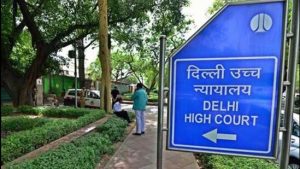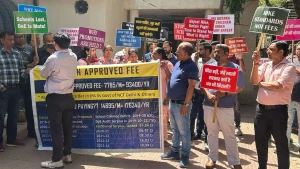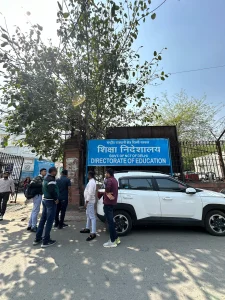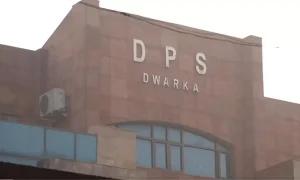New Delhi – The ongoing DPS Dwarka Fee Row has reached a critical juncture as the Delhi High Court delivered a significant ruling on Wednesday, directing over 100 parents to pay 50% of the hiked fees from the 2024-25 academic session. This landmark decision in the DPS Dwarka Fee Row represents a major development in the months-long dispute between parents and Delhi Public School, Dwarka administration.
High Court’s Decisive Ruling on Fee Payment
Justice Vikas Mahajan’s bench addressed the complex DPS Dwarka Fee Row by rejecting parents’ requests to charge only approved fees for the 2025-26 academic session. The court’s comprehensive 17-page order in the DPS Dwarka Fee Row established clear guidelines for fee payment while the Directorate of Education (DoE) reviews the school’s fee structure.

The judicial intervention in the DPS Dwarka Fee Row came after parents failed to provide concrete proof regarding DoE’s rejection of fees fixed by the school from the 2024-25 session. Justice Mahajan emphasized that while parents raised legitimate concerns in the DPS Dwarka Fee Row, the absence of documented evidence regarding fee disapproval affected their case’s strength.
The court’s decision in the DPS Dwarka Fee Row mandates that students’ families deposit 50% of the increased school fees for academic years 2024-25 onwards, ensuring educational continuity while protecting students from potential victimization during the ongoing dispute.
Legal Framework Governing School Fee Regulations
The DPS Dwarka Fee Row highlights important aspects of educational law governing fee structures in private schools. Justice Mahajan clarified that existing legislation permits schools to fix fees according to projected expenses without requiring prior DoE approval, though the authority retains power to examine whether such decisions are rational and non-arbitrary.
Also Read: Dynamic Delhi Govt 100 Day Report Card To Be Unveiled at JLN Stadium on May 31
This legal principle underlying the DPS Dwarka Fee Row establishes a delicate balance between institutional autonomy and regulatory oversight. Schools can implement fee structures based on legitimate operational requirements, but educational authorities maintain supervisory jurisdiction to prevent unreasonable or discriminatory practices.
The judicial interpretation in the DPS Dwarka Fee Row reinforces that fee-setting mechanisms must follow established procedures while ensuring transparency and fairness for all stakeholders. This framework provides clarity for future cases involving similar disputes between educational institutions and parent communities.
Protection Against Student Discrimination
A crucial aspect of the court’s order in the DPS Dwarka Fee Row addresses concerns about student victimization and discrimination. Justice Mahajan specifically directed that students cannot face adverse consequences due to non-payment of disputed fees, reinforcing protections established in previous court proceedings.
The court’s emphasis on preventing discrimination in the DPS Dwarka Fee Row reflects broader educational principles prioritizing student welfare above administrative disputes. This protective approach ensures that academic progress remains unaffected while legal proceedings continue to resolve fee-related conflicts.
The judicial directive in the DPS Dwarka Fee Row requires both the school and DoE to comply with interim directions from the coordinate bench’s April 16 order, which explicitly prohibited discrimination and victimization based on fee payment status.
Parents’ Petition and Legal Arguments
The DPS Dwarka Fee Row originated from a comprehensive petition filed by over 102 parents challenging the school’s decision to implement fee hikes for the 2025-26 academic session. Their legal challenge in the DPS Dwarka Fee Row sought specific directions requiring DoE and Lieutenant Governor VK Saxena to intervene in the school’s management practices.


The parents’ primary concern in the DPS Dwarka Fee Row centered on alleged harassment of students due to non-payment of unapproved fees. Their petition requested that the school charge only approved fees for current and future academic sessions, emphasizing the need for regulatory compliance.
The legal strategy employed by parents in the DPS Dwarka Fee Row demonstrated systematic efforts to address perceived irregularities in fee implementation while seeking protection for affected students and families throughout the dispute resolution process.
Student Expulsion Controversy
The DPS Dwarka Fee Row intensified significantly when the school struck off names of 32 students on May 9, preventing their entry by deploying security personnel. This controversial action in the DPS Dwarka Fee Row triggered widespread protests from dozens of parents who gathered to demonstrate against the school’s decisions.
The student removal incident in the DPS Dwarka Fee Row represented the latest flashpoint in an extended standoff between school administration and families refusing to pay revised fees lacking DoE approval. This escalation transformed the DPS Dwarka Fee Row from an administrative dispute into a broader community concern affecting multiple stakeholders.
Justice Sachin Datta’s separate bench has reserved orders on a petition filed by parents of the 32 expelled students in the DPS Dwarka Fee Row, seeking immediate reinstatement while addressing the underlying fee approval issues.
Timeline and Future Proceedings
The court has scheduled the next hearing in the DPS Dwarka Fee Row for August 28, providing a specific timeframe for DoE’s decision-making process regarding the disputed fee structure. This timeline in the DPS Dwarka Fee Row allows sufficient opportunity for thorough review while maintaining educational continuity for affected students.
The extended timeline in the DPS Dwarka Fee Row acknowledges the complexity of issues involved while ensuring that all parties have adequate opportunity to present their positions and supporting documentation before final resolution.
Implications for Educational Governance
The DPS Dwarka Fee Row has broader implications for educational governance and regulatory oversight in private school management. The case establishes important precedents regarding the balance between institutional autonomy and parental rights in fee-related decisions.
The resolution approach adopted in the DPS Dwarka Fee Row demonstrates judicial recognition of competing interests while prioritizing student welfare and educational access. This balanced approach provides a framework for addressing similar disputes in other educational institutions.
Regulatory Authority and Oversight


The DPS Dwarka Fee Issue underscores the important role of the Directorate of Education in monitoring and regulating private school operations. The court’s direction for DoE involvement in the DPS Dwarka Fee Row reinforces the authority’s responsibility to ensure fair and transparent educational practices.
The ongoing review process in the DPS Dwarka Fee Issue will establish clearer guidelines for fee approval mechanisms while strengthening regulatory frameworks governing private educational institutions throughout Delhi.
Community Impact and Stakeholder Concerns
The DPS Dwarka Fee Issue has generated significant community attention, highlighting broader concerns about educational affordability and accessibility in private schools. The dispute reflects growing tensions between rising operational costs and families’ financial constraints in contemporary educational settings.


The resolution of the DPS Dwarka Fee Issue will likely influence similar cases and establish precedents for handling fee disputes in educational institutions. The outcome will shape future relationships between schools, parents, and regulatory authorities in fee-related matters.
The comprehensive approach taken in addressing the DPS Dwarka Fee Issue demonstrates the complexity of modern educational governance while emphasizing the need for balanced solutions protecting all stakeholders’ legitimate interests in quality education delivery.

